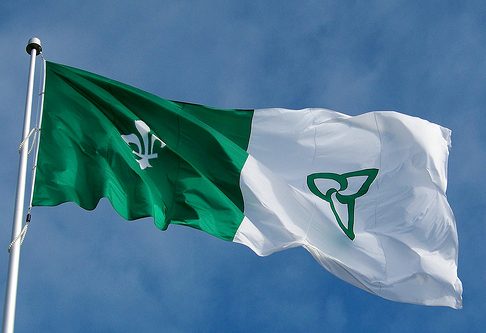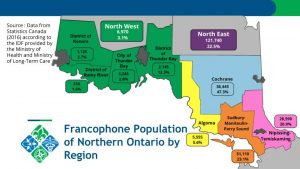Let’s Celebrate Franco-Ontarian Day!
Posted on September 22, 2020
Guest Column by: Monique Rocheleau, Assistant Executive Director, Réseau du mieux-être francophone du Nord de l’Ontario and Chair, NOSM’s Francophone Reference Group and Danielle Barbeau-Rodrigue, NOSM’s Director, Francophone Affairs Unit
Hello, Aaanin, Boozhoo, Bonjour!
September 25 is an important day for Franco-Ontarians
September 25, 1975 was an exciting day, as the Franco-Ontarian flag was flown for the very first time at the University of Sudbury which is located at the Laurentian University campus. The Franco-Ontarian flag, created in Sudbury by Dr. Gaétan Gervais, professor of History at Laurentian University and a group of his students, was officially recognized by the Ontario Government as the official symbol of the Francophone community on June 21, 2001 by legislative decree. Many communities and organizations across Northern Ontario now proudly fly the Franco-Ontarian flag.
 The Franco-Ontarian flag consists of two vertical bands. The first band is green with a white fleur-de-lis (lily), which represents the French-speaking community worldwide. The second band is white with a green trillium, the provincial flower of Ontario. Green was chosen by the designers to evoke summer, while the use of white brings to mind winter. Together, the two colours represent the two poles of Ontario’s climate.
The Franco-Ontarian flag consists of two vertical bands. The first band is green with a white fleur-de-lis (lily), which represents the French-speaking community worldwide. The second band is white with a green trillium, the provincial flower of Ontario. Green was chosen by the designers to evoke summer, while the use of white brings to mind winter. Together, the two colours represent the two poles of Ontario’s climate.
In 2010, the Ontario Government declared that September 25 would henceforth be known as Franco-Ontarian Day. This day is a time to celebrate the Francophone community in Ontario in all its diversity (heritage, language, culture) and to recognize the long history of Francophones in Ontario. We’ve been here since 1613!
Aligning mandates
NOSM’s Northern Ontario-wide campus has a large Francophone population. The Inclusive Definition of Francophones (IDF), used to capture the number of Francophones living in Ontario, states there are 22.5 % Francophones in the Northeast and 3.1 % in the Northwest (Ministry of Health data from the 2016 census). In 2009, the province adopted this definition to capture those whose mother tongue is neither French nor English, but who have a particular knowledge of French as an Official Language and use French at home, including many new comers to Ontario.
The French Language Services Act and NOSM’s mandate both have a focus on social accountability, inclusiveness, respect and equity. These are vital factors when working with official language minority communities, such as Francophones. Developing clear expectations as they pertain to French-language services remains a key priority for NOSM. We are striving to move forward with the implementation of the Active Offer of French language services in the organizational culture of NOSM. This provides an opportunity for learners, staff, and faculty to gain an increased awareness on how best to respond to the needs of Francophones.
The French Language Services Act guarantees an individual’s right to receive services in French from the provincial government’s ministries and agencies in the 26 designated areas. Nine of the designated areas are located in the North. Within these designated areas, you will also find designated agencies. These agencies have gone through a rigorous process to ensure that they are able to offer French language services on a permanent basis. There are 243 designated agencies in Ontario. We have 45 designated agencies in the North, with the majority located in the northeastern region.


What is the Active Offer and why is it so important?
An Active Offer means that you are proactively offering quality French language services which are available at all times, clearly communicated, visible, easily accessible and equivalent to the quality of services offered in English. The benefits to the patient is a better understanding, increased satisfaction and better self-care management. As a provider of services it means quality and safety of care, patient-centered approach and better coordination of services. Various tools and resources are available to assist you in the provision of an Active Offer. You do not have to be Francophone or a French-speaker to provide an Active Offer. The Réseau du mieux-être francophone du Nord de l’Ontario provides resources and tools in order to support your engagement in Active Offer. Active Offer training is available at activeoffertraining.ca.
The art of treating patients in French
Dr. Crystal Boulianne, NOSM Assistant Professor and alumna (MD Class of 2017, Family Medicine 2019), is committed to eliminating linguistic barriers that affect the quality of health care for the Francophone population of Kapuskasing. Learn more in this article, The Art of Treating Patients in French. Hear Dr. Boulianne tell us about her passion to offer equitable medical services for all her patients.
Recognizing our Francophone partners
Franco-Ontarian Day is also a wonderful opportunity for the School to celebrate the significant contributions of NOSM’s Francophone Reference Group (FRG) and its Francophone community and partners. The FRG works closely with the Francophone communities and provides recommendations to the Dean on how NOSM can respond to the needs of Francophones. The FRG’s membership represents various sectors within the Francophone community such as, health professionals, postsecondary institutions, decision-makers, NOSM medical students and residents and the public at large. We would like to take the opportunity to thank past and present committee members for their dedication and commitment to the improvement of French language and culture at NOSM.
As part of the new Strategic Plan 2020-2025 launching this fall, NOSM will renew the Francophone curriculum, build a Francophone health pathway and support research into Francophone health.
We are also working closely with staff and faculty on how best to integrate Francophone learning opportunities within the NOSM curriculum and add additional Francophone experiences for learners.
It’s exciting to be contributing to a future generation of physicians who will have the skills and knowledge needed to offer accessible services in French and ensure a culturally-safe environment for their patients.
We wish each and every one of you a wonderful Franco-Ontarian Day!
Please continue to follow my journey on Twitter @ddsv3 using #WhereisDrVerma
I welcome input on this blog and other issues you want to bring to my attention by email to dean@nosm.ca.
#TweetUp at NOSM and #NOSMRollCall
This week, medical students Madeleine Nolan (year two) and Justina Marianayagam (year three) organized a virtual Twitter in Medicine tutorial for all MD students. The goal of this presentation was to connect NOSM students with the dynamic network of Northern Ontario health-care providers on Twitter, and to begin sharing knowledge within that network. The #NOSMRollCall movement reached over 50 students and clinicians from across the province and Canada in the first two days, and responses continue to come in. I hope students continue to use this platform as a way to stay connected with up-to-date medical research, promote, advocate and learn from one another.
NOSM is the First to Experience Virtual Accreditation
NOSM will be the first medical school in Canada to experience and help pioneer a new virtual accreditation of its Undergraduate Medical Education program. The traditional accreditation, originally scheduled for spring, was postponed due to the pandemic. The new virtual accreditation is scheduled for the last week of October, 2020. The accreditation team is looking forward to the challenge and the new way of accreditation. To learn more, contact Cathy Powell, UME Accreditation Officer.
The Northern Ontario School of Medicine Launches Movement to Respect the Difference
The Northern Ontario School of Medicine (NOSM) is challenging high schools, communities, Canadian medical schools and the wider medical sector to join its Respect the Difference™ movement. The movement emphasizes actionable changes in organizational policy and in fostering a culture of kindness, respect, inclusivity and diversity.


